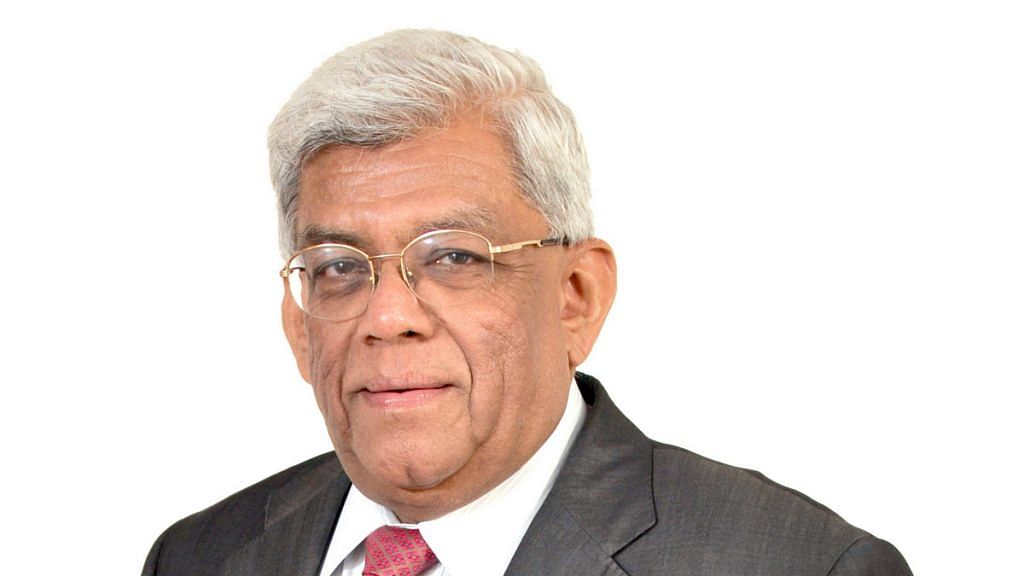New Delhi: HDFC Ltd chairman Deepak Parekh has said a one-year window for loan restructuring will give borrowers who are struggling with their cash flows a breather, but a moratorium will cause future problems.
In an ‘Off The Cuff’ interaction with ThePrint’s Editor-in-Chief Shekhar Gupta Monday, Parekh said Indian industry has asked the Reserve Bank for restructuring, as it had allowed in 2008-09, in the aftermath of the global financial crisis.
“Give one-year restructuring for this pandemic… We also want to help individuals, small buyers of property, and give them time to pay. Give them time to recover their income, give them time to find a job, give them time to divest their savings,” Parekh said.
“If you give a restructuring window of one year, that means you are not collecting money from anyone who does not want to pay. If they don’t want to pay, it doesn’t become an NPA. By giving a moratorium, we are creating a problem for later on,” he cautioned.
Parekh explained that around 10 per cent of borrowers pay on the 89th day, because the account becomes an NPA after 90 days. This happens because the borrowers are tight on resources and face liquidity issues.
The Covid-19 pandemic and the resultant economic fallout had prompted the central bank to announce a moratorium on repayments in March, which has been extended to last until 31 August. Parekh had last week pointed out that a blanket moratorium meant even those borrowers who could afford to pay were not repaying by taking advantage of the moratorium.
Instead, he had suggested loan restructuring, which would allow financial institutions to restructure accounts at their discretion, depending on the genuine need and problems faced by borrowers.
“Whatever is due on 1 March 2020, take it in March 2021. So for one year, give them a breather. There is a holiday to repay if they want to take that holiday. And extend the tenure of the loan,” Parekh said, adding that borrowers should not be asked to pay interest during this period.
“It is interest postponement and not a permanent deferment,” he added, reiterating that the intent of financial institutions is to help the borrowers.
Also read: Allow us to restructure loans but no need for blanket recast, banks tell RBI
Development finance institution
Parekh also touched upon the need for India to set up a development finance institution that can fund long-term infrastructure projects, and pointed out that banks are unable to do so as they do not have long-term funds.
The central government is working on setting up such an institution, as India looks to fasten the pace of infrastructure development.
“Banks are saying that we don’t have long-term funds. Their money comes from term deposits, current and savings accounts. They don’t have 15-year or 20-year money,” he said, stating that institutions like ICICI and IDBI used to provide long-term funding like 15-year loans in their earlier avatar as development finance institutions.
Asked if India needed to set up such an institution, Parekh said: “All infrastructure projects need long term money… We may have to think about it. It depends who puts up the capital and who is running it. It should be willing to take risks.”
Addressing industry chamber CII last week, Finance Minister Nirmala Sitharaman had said the proposal to set up a development finance institution was being worked on. “What shape it will take, we will know shortly,” she had said.
Such an institution in the infrastructure finance space was recommended by a task force set up to finalise the ambitious Rs 111 lakh crore National Infrastructure Pipeline. The taskforce, which submitted its report in April this year, had pointed out that there would be a gap.
Factoring service for MSMEs
Parekh welcomed the loan guarantee scheme for MSMEs announced by the government, but said this does not solve the stress in the existing portfolio.
“If you talk to bankers, they say that on the existing MSME portfolio, the NPAs are 12.5 per cent,” he said, pointing out that MSMEs are struggling with delayed payment of their bills by bigger public and private sector corporations.
“Payment culture is non-existent. MSMEs are squeezed from the big boys. The public and private sector don’t pay them on time. MSMEs say that instead of providing us more money, ensure that we are paid on time,” he said.
Parekh also highlighted the need for a factoring service for the MSMEs. Typically, MSMEs sell their goods on credit of 90 days to a larger firm. Under a factoring service, MSMEs can go to the agency and present the bill and can receive payment immediately against the bill at a small cost, rather than waiting 90 days for the payment. This helps in addressing their cash flow issues.
“You realise your debtors immediately… They discount the receivables and charge you 90 days’ interest,” he said, adding that attempts have been made in the past to provide an effective factoring service.
TReDS is an electronic platform authorised by the RBI for facilitating the financing/discounting of trade receivables due from companies, government departments and public sector undertakings of MSMEs.
Also read: Govt expands MSME loan guarantee scheme to include lawyers, doctors & large firms
